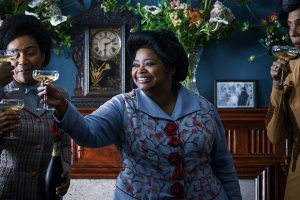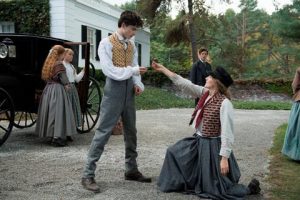Netflix’s Self-Made is a mere four episodes long, and each episode is under an hour long, but somehow never once feels too short or too fast-paced: in fact, at multiple points while watching the miniseries, I found myself mistakenly thinking I had watched more episodes than I really had. And that’s because there’s a lot of material in this show – because, shocker, the story of Madam C.J. Walker, America’s first self-made female millionaire and a pioneer in black history, is actually just as fascinating as the oft-repeated tales of rich white men. Who’d have guessed?
Showrunner Kasi Lemmons doesn’t just focus on all the defining moments of Madam C.J. Walker’s life either: while the series does center around this incredible woman’s rise to fame and fortune and the legacy that outlasted her, Lemmons also finds time to turn the spotlight on two equally interesting women who circled the Madam during her life: her daughter A’Lelia, who became a fixture of Harlem culture during the 1920’s; and Addie Monroe, a fictional character heavily based on Madam C.J. Walker’s real-life business partner and later rival, Annie Malone.

These three women each find themselves using different tactics and strategies to navigate through early 20th Century America, but it’s Madam C.J. Walker, a St. Louis laundress who starts out the series having just been abandoned by her abusive, alcoholic husband, who comes out on top, rising to prominence as the leading creator and seller of hair and beauty products for black women. From her humble beginnings as the daughter of former slaves to sharing a scene with another Gilded Age tycoon, John D. Rockefeller himself (who offers her some characteristically unhelpful advice on how to deal with workers’ strikes), the Madam is portrayed as a woman determined to make a name for herself and find independence and purpose in what was almost exclusively a man’s world. Octavia Spencer, of course, delivers a fantastic performance, bringing out Madam C.J. Walker’s humor, big heart, and fiery determination: though the series could easily have depicted the Madam as an invincible character breaking down the patriarchy one business deal at a time (and indeed, the idea is tempting, never more so than when our heroine challenges the noted activist Booker T. Washington over his sexist views), it instead succeeds because of how it shows her as a woman with ordinary flaws and weaknesses, as well as incredible strength. This is most apparent when it comes to her relationships with her family: from her husband, C.J. Walker, who has some…difficulty…being anything less than the Walker family’s sole breadwinner; to her father-in-law, who somehow manages to be the funniest character on a show that also stars Tiffany Haddish; to Haddish’s A’Lelia, Madam C.J. Walker’s daughter and closest confidante.
A’Lelia is a brilliant, larger-than-life figure alongside her more reserved, steely mother. She kind of has to be: A’Lelia became most famous later in life for her contributions to the arts as a patron of black musicians, artists, writers and other creatives. The series spends a considerable amount of time following A’Lelia as she come to terms with the fact that she doesn’t share her mother’s dreams, and simultaneously discovers her true calling. But she and her mother clash a number of times as they diverge on how to establish a legacy for the Walker company and family. This situation is made more volatile when it becomes clear that A’Lelia is a member of the LGBTQ+ community, who has no interest in settling down with a husband or having children.
And then we have Carmen Ejogo’s Addie Monroe, a character who, as I previously noted, is based on Madam C.J. Walker’s actual business rival. Though she initially comforts and cares for Walker (back when the Madam was still only destitute Sarah Breedlove, doing chores for Monroe in exchange for hair-growth treatments), she quickly parts ways from her former friend after Walker expresses an interest in helping Monroe sell her product – which Monroe, a light-skinned African-American woman, thinks will destroy her public image. But when Walker’s own products outsell Monroe’s and threaten the latter’s business, the rivalry between the two entrepreneurs forces them to think up bigger, bolder plans for their companies, until they both become obsessed with trying to outsmart each other.

But in the end, even though Monroe is still mostly a villainous character, she’s also a businesswoman just like The Madam – and a theme prevalent in Self-Made is that when one woman succeeds, all women succeed. It becomes the cornerstone of Walker’s career, and we see its effects near the finale of the series during a montage (which is strongly reminiscent of an infomercial, but I’ll let that slide) of various women who break the fourth wall to talk about the ways that Walker inspired them to pursue their own dreams and forge their own paths in life – interestingly, there’s a fair bit of fourth wall breaking in the series: for instance, the events of the first episode are intercut with a scene of Walker and Monroe battling it out in a metaphorical boxing match. This is one of the series’ few questionable creative decisions, since it seems to have no real impact other than to make the aforementioned infomercial ending organic rather than jarring.
Apart from that, the series has impeccable production design, cinematography and, of course, hair and makeup (“Hair is power,” Walker declares in one scene: and she couldn’t be more right). Kasi Lemmons and her team have done an excellent job bringing this historical heroine’s life story to the screen in a way that makes her feel very much alive, and just as monumental as any of the Rockefellers, Vanderbilts and Carnegies.
So what did you think of Self-Made? Share your own thoughts and opinions in the comments below!
Series Rating: 9/10



